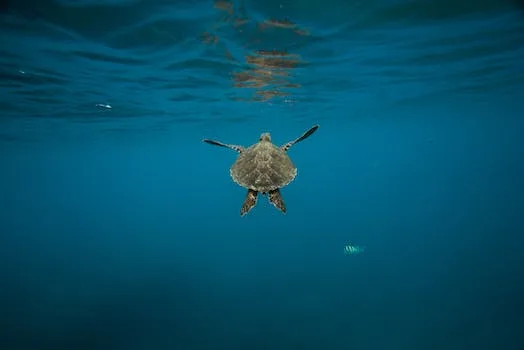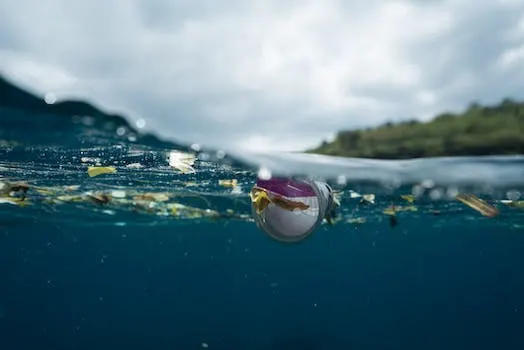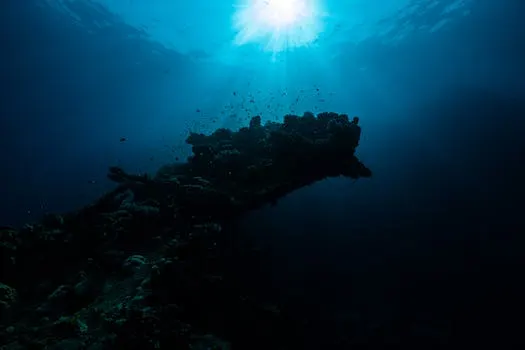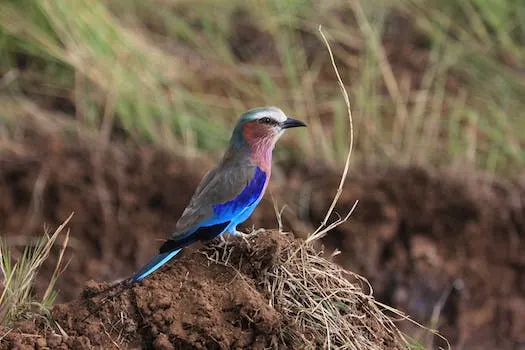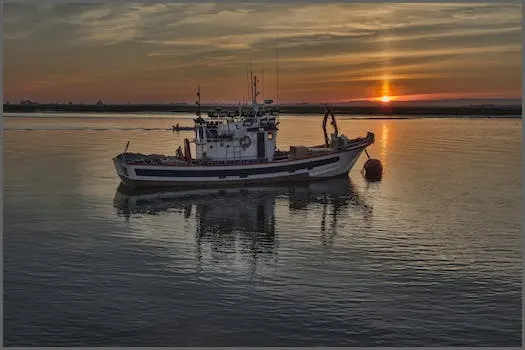
Overfishing: The Silent Killer of Our Oceans
The world's oceans are facing a silent yet serious threat: overfishing. This occurs when humans take too many fish from the water, leading to a decrease in the fish population and throwing the entire marine ecosystem out of balance. The effects of this problem have become increasingly apparent in recent years, with physical damage or destruction from coastal development, dredging, quarrying, destructive fishing practices and gear, boat anchors and more all contributing to its devastating impacts.
Coral reefs are particularly vulnerable to overfishing due to their reliance on plant-eating fish that keep these ecosystems in balance by eating algae. When these species become underpopulated due to unsustainable fishing practices, it can lead to the depletion of key reef species in many locations. Decades of harvesting the seas have disrupted this delicate balance of marine ecosystems and caused irreparable damage that is now being felt around the world.
Overfishing means catching too many fish at once so that their population becomes too depleted for them to recover naturally. This has led not only to a decrease in available seafood but also threatens other ocean life such as coral reefs and habitats for other species like dolphins or whales. The integrity of ocean ecosystems is further threatened by climate change, pollution and overfishing - making it essential that we take steps now towards reversing this damage before it's too late. A new sprint is looking for innovative solutions that can help us protect our oceans from further destruction caused by overfishing before it's too late - something we must all strive towards if we want future generations to be able enjoy our planet's natural beauty without fear of losing it forever.
What is Overfishing?
Overfishing is a major threat to the health of our oceans. It occurs when more fish are taken from the ocean than can be naturally replaced, leading to a decrease in fish populations and an overall decline in ocean health. This can be caused by a variety of factors, such as trawling – large fishing vessels that drag large nets along the ocean floor – and illegal fishing practices, such as using cyanide or other toxic chemicals to catch fish. Additionally, ghost nets – abandoned plastic and nylon nets left in the ocean – can cause further damage to coral reefs and marine life.
Trawling is another destructive practice that has been linked with overfishing. boats drag large nets along the seabed, catching almost everything in their path and damaging coral reefs at shallow depths. The fishing industry also affects a number of marine conservation issues including water pollution, habitat degradation, and declines in fish populations which have ecosystem-wide impacts on dependent human communities who rely on them for food security or income generation.
Researchers have found that overfishing leads to reduced biodiversity due to species extinction or population collapse; it also reduces genetic diversity within species which makes them more vulnerable to environmental changes like climate change or disease outbreaks. Furthermore, it disrupts food webs by removing keystone species like sharks which play an important role in maintaining balance within ecosystems; this can lead to further declines in biodiversity as well as increased competition between species for resources like food or shelter.
The consequences of overfishing are far-reaching: not only does it threaten our oceans’ health but it also has implications for global food security since many people rely on seafood for sustenance or income generation from fisheries-related activities such as tourism or aquaculture production systems. To protect our oceans from further destruction due to overfishing we must take action now: governments should implement regulations that limit catches while encouraging sustainable fishing practices; consumers should choose sustainably sourced seafood products whenever possible; and businesses should invest in research into alternative sources of protein so we don’t needlessly deplete our oceans’ resources any longer than necessary
The Effects of Overfishing
The effects of overfishing can be devastating. Not only does it threaten the fish population, but it also puts other species at risk. When too many fish are taken from the ocean, predators that rely on them for food may be forced to migrate to other areas or suffer from malnutrition. This can lead to destruction of coral reefs and other habitats, as well as disruption of the entire marine food chain. Overfishing can also cause economic damage; when the fish population is reduced, fishermen may be forced to search for other sources of income, leading to a decrease in their income and economic instability in coastal communities.
The direct impacts of overfishing can reduce fish biomass and affect biodiversity and sustainability of fisheries. It can also change the size of remaining fish populations, as well as how they reproduce and mature. In addition to harvesting large amounts of seafood for sale, large-scale fishing operations often unintentionally kill non-target species such as turtles or dolphins due to bycatch. Overfishing is particularly damaging when it targets herbivores like sardines or anchovies because these species are essential for maintaining healthy ecosystems by controlling algae growths that would otherwise smother coral reefs or disrupt seagrass beds which provide shelter for juvenile fishes and crustaceans alike.
When too many herbivores are fished out at once, their populations decline rapidly and stocks become depleted below their most productive level - an unsustainable situation with far-reaching consequences on both local economies and global markets alike. As a result, entire ecosystems become unbalanced which further exacerbates problems such as water pollution caused by agricultural runoff or climate change induced ocean acidification - all issues that have been linked back to overfishing in some way or another making this silent killer one we must address if we want our oceans remain healthy into future generations.
Solutions to Overfishing
Rights-Based Fishery Management is a key solution to overfishing. This approach gives fishing rights to local communities, allowing them to manage their own fisheries and set sustainable catch limits. Sustainable Fishing Reforms are also necessary, such as the implementation of quotas and bans on certain types of fishing gear or techniques. Traceability Standards can help ensure that fish are caught sustainably by tracking the source of seafood from boat to plate. Declaring Marine Protected Areas is another important step in protecting fish populations from overfishing, as these areas provide refuge for fish stocks and allow them to repopulate naturally. Finally, Fish Farms can be used as an alternative source of seafood that does not rely on wild-caught fish stocks.
In order to reduce the impact of overfishing, it is essential that people become aware of the problem and take action towards finding solutions. Education about sustainable seafood consumption should be encouraged through campaigns and initiatives aimed at raising awareness about this issue. Additionally, organizations working towards protecting ocean health should be supported in order to ensure that regulations are enforced properly and effective measures are taken against overfishing activities.
One way in which this can be done is through Rights-Based Fishery Management which gives local communities control over their own fisheries so they can set sustainable catch limits for themselves without relying on external regulation or enforcement mechanisms. Sustainable Fishing Reforms such as quotas or bans on certain types of fishing gear or techniques must also be implemented in order for these reforms to have any effect on reducing the impact of overfishing activities worldwide. Traceability Standards should also be put into place so that all sources of seafood can be tracked from boat to plate in order to ensure sustainability throughout the entire supply chain process when it comes down sourcing seafood products responsibly without contributing further towards depleting wild-caught fish stocks due to unsustainable practices such as illegal fishing activities or bycatch issues caused by large scale commercial operations targeting specific species with no regard for other marine life forms living within those ecosystems either directly or indirectly affected by those operations either directly or indirectly affected by those operations either directly or indirectly affected by those operations either directly or indirectly affected by those operations either directly .
Declaring Marine Protected Areas (MPAs) is another important step when it comes down tackling this issue since MPAs provide refuge for fish populations allowing them time away from human interference so they may replenish themselves naturally while providing a safe haven where other marine life forms may thrive undisturbed within their natural habitats free from human exploitation activities such as bottom trawling practices which have been known cause severe damage both direct and indirect upon fragile coral reef systems located around many parts around our oceans worldwide due mainly due its destructive nature when it comes down harvesting resources found within these delicate ecosystems located around our oceans worldwide . Finally Fish Farms offer an alternative source for obtaining seafood products without having rely solely upon wild caught species thus reducing pressure placed upon already depleted stock numbers found within our oceans today .
Conclusion
The consequences of overfishing are far-reaching and devastating. It can lead to the destruction of coral reefs, fish habitats, and other marine ecosystems, as well as economic instability in coastal communities. The harvesting of the seas has disrupted the delicate balance of marine ecosystems, leading to a decrease in key reef species in many locations. Overfishing also threatens food security by reducing fish populations that are essential sources of nutrition for many people around the world. In addition, it can cause economic hardship for fishing communities who rely on healthy oceans for their livelihoods.
Fortunately, there are steps that can be taken to reduce the impact of overfishing and protect our oceans from further damage. Regulations on fishing quotas should be enforced to ensure sustainable practices and prevent overharvesting from occurring. Raising awareness about this issue is also important so that people understand why it is necessary to take action now before it is too late. Finally, supporting organizations that work towards protecting our oceans will help ensure their health and vitality for future generations.
It is essential that we take steps now to address this issue before it becomes an even bigger problem than it already is today. By taking these measures we can help preserve our ocean’s resources while providing a secure future for those who depend on them for sustenance or livelihoods alike. With collective effort we can make sure our oceans remain healthy and vibrant long into the future!


